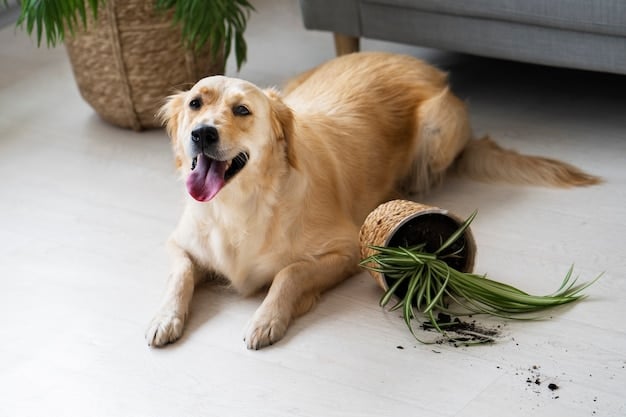Afterpay & ZIP Available
Same-day dispatch on orders before 3pm
10% OFF your first order: WELCOME10

In many parts of the world, the practice of burning sage(belonging to the mint family) has found a place in homes where the spiritual meets the everyday. However, as the trend continues to grow, so does the concern among pet owners about the impact of these practices on their furry family members, especially dogs.
Burning sage can be safe for dogs if done in a well-ventilated area, and exposure is limited. However, dogs with respiratory issues may be adversely affected. Always monitor your dog for any signs of distress.
This article delves into whether burning sage is safe for dogs, offering insights and guidance for pet owners.
When we choose to burn common sage in our homes, it’s crucial to consider the well-being of our four-legged family members.
Dogs have a very strong sense of smell. They can detect odours at concentrations nearly 100 million times lower than humans can.
This incredible sensitivity, while beneficial for their survival and behaviour, also means they are exceptionally vulnerable to the potent aroma emitted when we burn sage. The dense smoke and strong scent can easily become overwhelming, leading not just to potential discomfort but also to distress in some cases.
Given this sensitivity, it’s essential to ponder whether sage is safe for dogs, not just when it’s being burned but also in other contexts.
For instance, pet owners might wonder if sage safe for dogs when considering incorporating it into their diet. While sage in small amounts can be included in healthy homemade dog treats or a dog’s food, it’s important to use it sparingly. Large quantities can cause severe upset stomach in dogs, so moderation is key when adding any herb to your pet’s diet.
Moreover, the impact of sage smoke on a dog’s well-being extends beyond the immediate discomfort from the odour. Prolonged exposure to smoke of any kind can potentially lead to respiratory issues, especially in breeds predisposed to breathing problems.
Therefore, when choosing to burn sage, ensuring proper ventilation and limiting your dog’s exposure is advisable. This not only helps in mitigating the risks but also ensures that your home remains a comfortable environment for all inhabitants.
Incorporating sage into your dog’s diet or environment should be done with care and knowledge. While there are benefits to using natural herbs like sage, including as an ingredient in healthy homemade dog treats, the overarching principle should always be the safety and comfort of your pets.
If you decide to burn sage or introduce it into your dog’s food, closely observe their reaction and talk with a veterinarian if you have any concerns. This cautious approach ensures that the spiritual or cleansing practices you embrace do not inadvertently compromise your dog’s health or happiness.

When it comes to the well-being of our furry friends, understanding the potential risks and concerns associated with burning sage is paramount. The act of burning sage, be it garden sage or white sage, introduces smoke into the environment, which can pose a significant health risk to dogs. This is especially true for those with pre-existing respiratory conditions such as asthma or bronchitis.
The particulate matter in smoke can exacerbate these conditions, leading to difficulty breathing, coughing, or even more severe respiratory distress.
Furthermore, the potent aroma of sage, while often pleasant and soothing to humans, can be overwhelming for dogs. Their acute sense of smell makes them particularly sensitive to strong odours, and the intense fragrance of burning sage, whether garden sage or the more potent white sage, can cause discomfort or anxiety.
In some cases, dogs may exhibit allergic reactions to the smoke, manifesting as sneezing, itching, or skin irritation.
It’s also crucial for pet owners to consider dietary concerns. While discussing whether dogs can eat sage, it’s important to note that, in moderation, garden sage can be a safe and potentially beneficial herb for dogs, contributing to healthy homemade dog treats. However, not all types of sage are created equal.
For example, white sage, often used in sage smudging ceremonies, should not be ingested by dogs idue to its higher concentration of essential oils, which can be toxic in large amounts. Therefore, understanding how to use sage properly is essential for pet owners looking to incorporate this herb into their dog’s diet or home environment.
Ensuring the safety of our dogs means not only being aware of the potential risks associated with burning sage but also taking proactive steps to mitigate these risks. This includes burning sage in well-ventilated areas, keeping our dogs in mind when choosing to burn sage or incorporating it into their diet, and always observing them closely for any signs of distress or adverse reactions.
By prioritizing the health and comfort of our pets, we can enjoy the benefits of sage while ensuring our dogs remain safe and happy.
For pet owners who wish to continue the practice of burning sage while ensuring the safety and comfort of their dogs, as well as those considering whether dogs can eat sage for its health benefits, here are some tips:
Always burn sage in a well-ventilated area to minimize smoke concentration. Open windows and doors to ensure that fresh air can circulate freely, reducing the amount of smoke your dog is exposed to. This step is important to prevent the buildup of smoke, which can be harmful to your dog’s respiratory system.
Keep a close eye on your dog’s behaviour and physical reactions during and after the smudging process. Be vigilant for any signs of discomfort or respiratory distress, such as coughing, sneezing, or appearing anxious. Dogs’ heightened sensitivity to smells means they might find the intense odour of sage overwhelming.
Keep smudging sessions brief, and consider keeping your dog in a different room or an outdoor area during the process. Limiting your dog’s exposure to sage smoke is key to ensuring their comfort and health, especially for those with pre-existing respiratory conditions.
Explore alternatives to burning sage, such as using sage essential oils in diffusers. However, it’s essential to remember that not all essential oils are safe for dogs or even cats. Before introducing sage in any form into your home, consulting with a veterinarian is crucial to ensure it’s safe for your pet.
When considering if dogs eat sage or if you should feed sage to your dog, be aware that sage has natural anti-inflammatory properties that can offer health benefits. However, it should be introduced into a dog’s diet carefully and in moderation to avoid any potential risks.

By following the recommended safety precautions and staying attentive to their pets’ needs, dog owners can ensure a harmonious balance between their spiritual practices and the health and comfort of their canine companions.
While some breeds may be more sensitive than others, caution should be exercised for all dogs, especially those with known respiratory issues. But sage is not one of the toxic herbs that dogs can’t be around.
Like dogs, other pets such as cats and birds may also be sensitive to smoke and strong odours. It’s advisable to apply similar precautions across all household pets.
Signs may include coughing, sneezing, watery eyes, or showing signs of anxiety or discomfort. Your dog’s nose may be runny as well. If any of these are observed, it’s best to cease the practice immediately and consult a veterinarian.

Collections
Subscribe
Sign up to our mailing list to get 10% off your first order, find out about new products and weekly sales.
2024 Incensen
Thank you for signing up for Incensen.
Your 10% off code is:
Sign up for our mailing list to get 10% off your first order and learn about new products and sales.